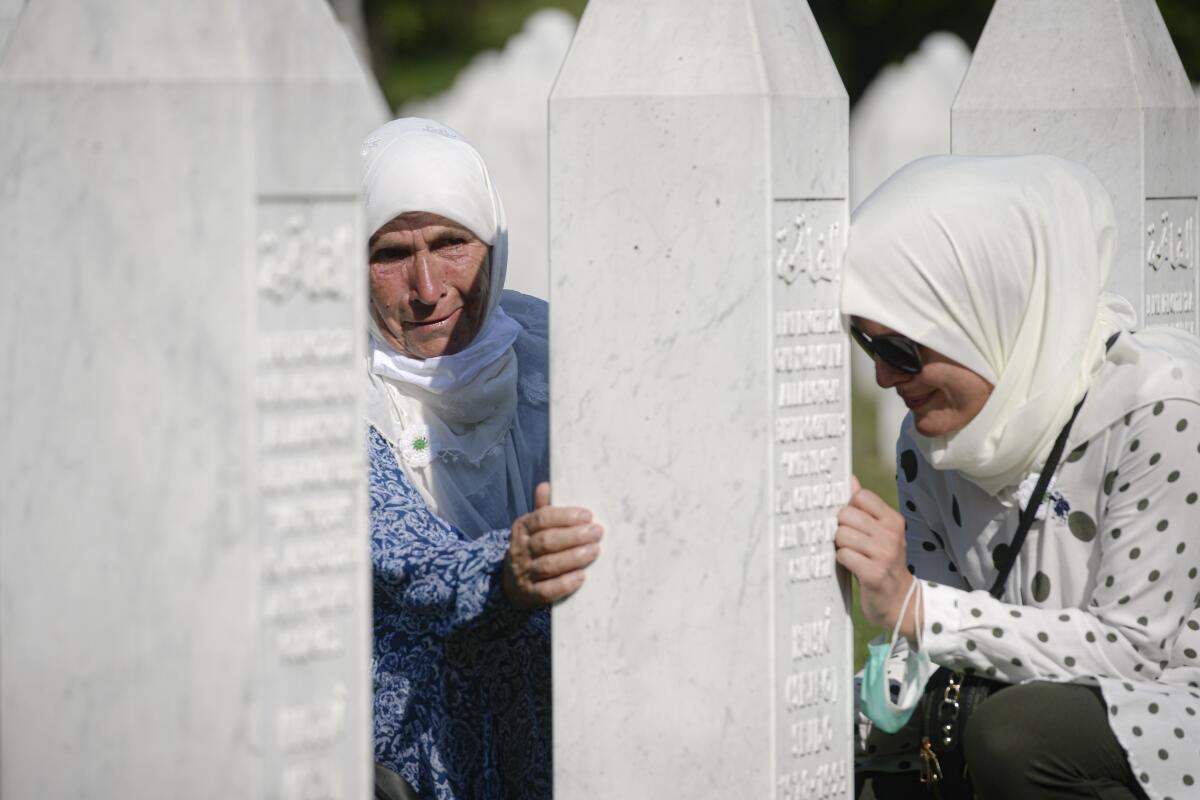Survivors mark 25th anniversary of Srebrenica massacre of more than 8,000 in Bosnia

- Share via
SREBRENICA, Bosnia-Herzegovina — Joined virtually by world leaders, the survivors of Bosnia-Herzegovina’s 1995 Srebrenica massacre on Saturday remembered the victims of Europe’s only acknowledged genocide since World War II and warned of the perpetrators’ persistent refusal to fully acknowledge their responsibility.
Speaking at a commemoration ceremony for the thousands of massacre victims, held in the memorial center and cemetery just outside Srebrenica, a top Bosnian official warned that the extent of the 1995 slaughter was still being systematically denied despite irrefutable evidence of what happened.
“I am calling on our friends from around the world to show, not just with words but also with actions, that they will not accept the denial of genocide and celebration of its perpetrators,” said Sefik Dzaferovic, the Bosnian Muslim member of the country’s tripartite presidency.
“The Srebrenica genocide is being denied [by Serb leaders] just as systematically and meticulously as it was executed in 1995. … We owe it not just to Srebrenica but to humanity to oppose that,” he added.
In July 1995, at least 8,000 mostly Muslim men and boys were separated by Serb troops from their wives, mothers and sisters, chased through woods around Srebrenica and killed by those forces in what is considered the worst massacre on European soil since Nazi Germany.
The killing rampage was the most brutal episode of the 1992-95 war in Bosnia, which began after the breakup of Yugoslavia. More than 100,000 people, an overwhelming majority of them Bosnian Muslim civilians, were killed in the war involving Bosnian Serbs, Croats and Muslims before a peace deal was brokered in 1995.
After murdering their victims in Srebrenica a quarter of a century ago, Bosnian Serb soldiers dumped their bodies in mass graves scattered around the eastern town in an attempt to hide evidence of the crime.
Thanks to an international forensic effort, body parts are still being found in death pits, put together and identified through DNA analysis. Close to 7,000 of those killed have been found and identified so far.
Newly identified victims are reburied each year on July 11 — the anniversary of the day the killing began in 1995 — in the vast and still expanding memorial cemetery outside Srebrenica. On Saturday, the remains of nine men and boys were laid to rest.
What took place in Srebrenica was a mark of shame for the international community because the town had been declared a United Nations “safe haven” for civilians in 1993. But two years later, the outnumbered, outgunned U.N. peacekeepers could only watch as the Bosnian Serb troops separated the town’s men and boys for execution, busing the women and girls to Bosnian government-held territory.
Dozens of world leaders, who were prevented by the COVID-19 pandemic from attending the commemoration service in person, sent video messages Saturday in which they urged tolerance and reconciliation in Bosnia, a nation that remains deeply ethnically divided. They included Canadian Prime Minister Justin Trudeau, Spanish Prime Minister Pedro Sanchez, U.S. Secretary of State Michael R. Pompeo and Britain’s Prime Minister Boris Johnson and Prince Charles.
Some international speakers also addressed the continued refusal by Serb leaders in Bosnia and neighboring Serbia to acknowledge the extent of the Srebrenica slaughter and the ongoing suffering of its survivors.
Judge Carmel Agius, president of the U.N. court that is completing war crimes trials stemming from the breakup of Yugoslavia, warned in his video message that the victims of the Srebrenica massacre “continue to be tormented by those who attempt to deny their lived experiences, and, thereby, their very existence.”
Similar sentiments were echoed by the U.K.’s Johnson.
“I want to join with you once more in mourning the victims of those terrible events, and to stand with the families in their fight for justice,” Johnson said in his video message. “There are those who would prefer to forget or deny the enormity of what took place. ... We must not allow that to happen.”
Bosnian Serb wartime political leader Radovan Karadzic and his military commander Ratko Mladic were both convicted of and sentenced for genocide in Srebrenica by a special U.N. war crimes tribunal in The Hague. In all, the tribunal and courts in the Balkans have sentenced close to 50 Bosnian Serb wartime officials to more than 700 years in prison for the Srebrenica killings.
Bosnian Serbs, however, still celebrate Karadzic and Mladic as heroes. Some were even staging celebrations of “the 1995 liberation of Srebrenica” on the anniversary of the crime.
In fact, Bosnian Serb political leaders have consistently prevented the country from adopting a law that would ban genocide denial, with the Serb member of Bosnia’s presidency, Milorad Dodik, even publicly describing the Srebrenica slaughter as a “fabricated myth.”
More to Read
Sign up for Essential California
The most important California stories and recommendations in your inbox every morning.
You may occasionally receive promotional content from the Los Angeles Times.













